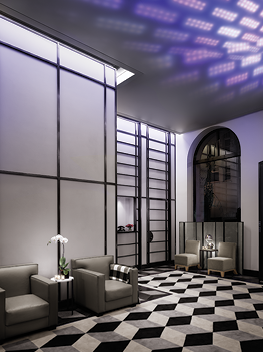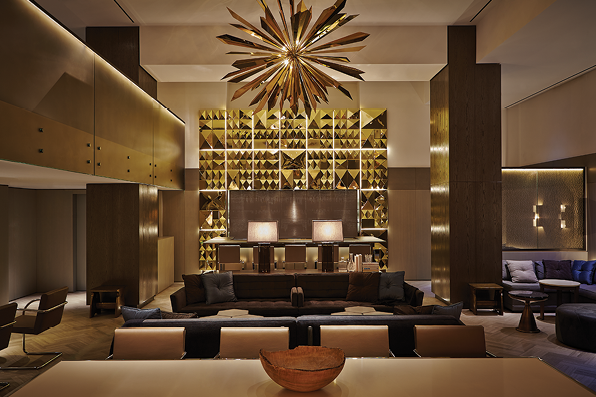- Home
- Media Kit
- Current Issue
- Past Issues
- Ad Specs-Submission
- Ad Print Settings
- Reprints (PDF)
- Photo Specifications (PDF)
- Contact Us

![]()
ONLINE

A Zen Environment
Editors’ Note
Debbie Riga has held her current post since January 1999. Before this, she was International Sales Director for Morgans Hotel Group and prior to that International Sales Manager for Hyatt Hotels Corporation and Sales Manager for Utell International.
Property Brief
From the moment it opened its doors on Madison Avenue in New York City, Morgans New York (morganshotelgroup.com/Morgans-NY) startled the world with a convention-shattering attitude and distinctive design sensibility, concocted by legendary designer Andree Putman. Again in 2008, Morgans unveiled Andree Putman’s powerful reinterpretation of the first “boutique hotel” that propels Morgans’ spirit forward without changing its unique character. Other features include a state-of-the-art fitness center. Conveniently located in Midtown Manhattan, Morgans is just steps to Grand Central Station, Macy’s Herald Square, and The Morgan Library Museum.
Where do you see the market today and is there growth within it?
We forget that these cycles happen. I worked in New York when the average occupancy was in the 70s, which was normal in the late 1970s for New York. There have been cases of overbuilding of properties and then a recession comes around causing an overabundance of hotel rooms, and it’s a struggle. It happened in 2008.
That said, New York has a tendency to grow into itself over the years – I’ve seen that over and over again.

Morgans New York lobby
This is a particularly challenging cycle because there are so many new elements that are even more critical than the oversupply of rooms that may hamper travel, such as Airbnb and the fear of terrorist attacks. There are a lot of elements that come into play, and we have to work around them and do the best we can. Each hotel has to figure it out for itself as to how best to function. Service becomes even more important in a climate like this.
This property is focused around service but is also known to have a great lifestyle offering. How do you balance those two?
It’s critical because we can’t survive just on reputation alone. This hotel was opened in 1984 and it was very different from everything else that had opened during that time. We often say it’s New York’s first boutique hotel.
We can’t survive on design and our history alone; there is a feel to a property and an essence, and maintaining that and being obsessive about it is critical.
This hotel is known to people as having a Zen environment – calming, somewhere to retreat from the madness of the city. This is our DNA.
What is different now versus years ago is that people can do enough research to determine that a hotel is the right one for them.
It is Morgans casual but gracious and authentic service that makes people want to stay with us.

Morgans New York restaurant and lounge
How critical is the strong suite offering?
It’s critical, especially during certain times of year. We have a large suite ratio to our regular rooms at Morgans. There are times of the year when people bring their children or a parent. There are people who like the extra space. We’re finding we can make the suites more palatable by coming closer to what the Superior room rate is, and not making such a huge differentiation in rate makes it more likely that someone will buy a suite.
How critical is the investment in training your people and the retention?
We’re not scripted; we let employees be who they are, but our Core Values must come through with each and every interaction. Obviously, a guest who has stayed with us 200 times becomes more like a friend, and the conversations between team members and the guest will be different than when greeting a new guest. The consistency and comfort are so important to our repeat guests – it’s like coming home.
Training is vital but what matters even more are the people we hire – there are people who get joy in making others happy. That’s the trait I look for when I’m interviewing.
Are there certain characteristics specific to Morgans Hotel Group properties?
Each property is different. Although we have brands within brands, each hotel has its own feel. What runs through all properties are our standards, our DNA, our training and our core values. That is what runs like a bloodline throughout Morgans Hotel Group.
Has your role become more about business than hospitality?
If we lose the hospitality side, we lose the business so it’s important for a boutique property to maintain that. It is what guests look for in a small property like ours.
Being an hotelier is about people more than the technology or anything else. The business happens when we do the right things – otherwise, what is the point?
Did you know this was where you wanted to spend your career and what has made it so much fun?
I started early. I had a passion to travel and I got to do that because I worked for Utell International and then for Hyatt Hotels. The best education I had was from visiting different countries and experiencing different cultures.
I come from Mediterranean culture where hospitality is ingrained. My family didn’t have a lot of money but when guests came, I cannot tell you what my parents wouldn’t do to make it a special experience for their visitors.
What advice do you give young people about how to build a sustainable career in this field?
I had to take my own time and work on weekends to learn how different departments functioned. One has to put in what one is going to get out of it because no one will make someone a GM just because they received a Diploma. School prepares one for the working world but learning through experience is something else.
As much as I’d like to, I can’t cross-train everyone but I tell them if they want to put in a few more hours a day, they should sit down with a Department Head and learn the basics. I have found that hard-working, ambitious individuals embrace the opportunity to learn.
There are five GMs and Hotel Managers working in the city who have come out of Morgans. Nothing makes me happier than to see someone who was working at the front desk or in revenue management or housekeeping who moves up the ladder to General Manager. The five people I’m talking about didn’t necessarily go to the right schools, but they had a hunger to learn and a passion for the industry. It requires time and effort but the rewards are there for those who want a career in this wonderful industry.•